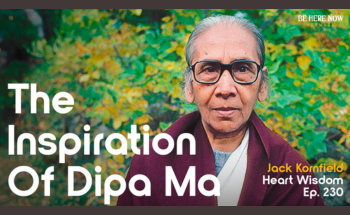When we examine our own minds we will inevitably encounter the root forces of greed, fear, prejudice, hatred, and desire, which create so much sorrow in the world. They become an opportunity for us. They raise a central question for anyone who undertakes a spiritual life. Is there some way that we can live with these forces constructively and wisely? Is there a skillful way to work with these energies? To understand the nature of happiness and sorrow, to find freedom in our life, we have to be willing to face all the demons in our mind. Depending on our relationship to these demons, or hindrances, they can be the cause of tremendous struggle or valuable fuel for the growth of insight. The first step necessary in working with these energies is to identify them clearly. Classically, there are said to be five primary hindrances, although you may have discovered some of your own.
The first hindrance is desire for sense pleasure: pleasant sights, sounds, smells, tastes, bodily sensations, and mind states. What’s the problem with desire—what’s wrong with it? Nothing, really. There’s nothing wrong with enjoying pleasant experiences. Given the difficulties we face in life, they are nice to have. But they fool us. They trick us into adopting the ‘‘if only’’ mentality: ‘‘If only I could have this,’’ or ‘‘If only I had the right job,’’ or ‘‘If only I could find the right relationship,’’ or ‘‘If only I had the right clothes,’’ or ‘‘If only I had the right personality, then I would be happy.’’ We are taught that if we can get enough pleasurable experiences, pasting them together quickly one after another, our life will be happy. A good game of tennis followed by a delicious dinner, a fine movie, then wonderful sex and sleep, a good morning jog, a fine hour of meditation, an excellent breakfast, and off to an exciting morning at work, and so on. Our society is masterful at perpetuating the ruse: ‘‘Buy this, look like that, eat that, act like this, own that . . . and you too can be happy.’’ There is no problem with enjoying pleasant experiences, and to practice does not mean to dismiss them. But they don’t really satisfy the heart, do they? For a moment we experience a pleasant thought or taste or sensation, and then it’s gone, and with it the sense of happiness it brought. Then it’s on to the next thing. The whole process can become very tiring and empty.
Of course, we don’t always ask for a lot; sometimes we settle for very little. At the beginning of a meditation retreat people often spend a lot of time dwelling on desires they carry in with them: ‘‘If only I had that house,’’ or ‘‘If only I had more money.’’ But as they settle into the limits placed on them by the retreat, the desires get smaller: ‘‘If only they would put out something sweet after lunch,’’ or ‘‘If only the sitting were five minutes shorter.’’ In a situation like a retreat—or a prison, for that matter—where the possibilities for fulfilling desires are limited, it becomes clear that the strength of a desire is determined not by the particular object, but by the degree of attachment in the mind, and the desire for a piece of candy can be as powerful as the desire for a Mercedes Benz. Again, the problem is not the object of desire, but the energy in the mind. The energy of desire keeps us moving, looking for that thing that is really going to do it for us. The wanting mind is itself painful. It’s a self-perpetuating habit that does not allow us to be where we are because we are grasping for something somewhere else. Even when we get what we want, we then want something more or different because the habit of wanting is so strong. It is a sense that being here and now is not enough, that we are somehow incomplete, and it keeps us cut off from the joy of our own natural completeness. We are never content. It is the same force in the world at large that creates the havoc of people wanting and consuming, hoarding, and fighting wars to have more and more, for pleasure and for security that are never fulfilled.
In India they say that when a pickpocket meets a saint, the pickpocket sees only the saint’s pockets. What we want will distort and limit our perception; it will determine what we see. If we are hungry and we walk down the street, we don’t see shoe stores or the weather or the clouds. We see there is a nice Greek restaurant. ‘‘I could have feta cheese and a nice salad,’’ or ‘‘There’s an Italian restaurant. Maybe I’ll have pizza or manicotti,’’ or ‘‘There’s McDonald’s. Maybe I’ll have a burger.’’ People can get so lost in the imagination that meditators on retreat have often glimpsed a potential partner and gone through a whole romance (meeting, courtship, marriage, children, even divorce) without ever actually saying a word to that person. We call this the vipassana romance. So the force of desire can cloud our minds, bringing distortion and delusion in its wake. As it says in the Tao Te Ching, ‘‘The secret waits for eyes unclouded by longing.’’ We can see how desire interferes with our being able to open up to things as they are, in a freer, more joyful way. It interferes with our power to deeply open to the truth, to relate directly and wisely to what is actually here.
The second difficult energy we encounter is aversion, hatred, anger, and ill will. While desire and the wanting mind are seductive and can easily fool us, the opposite energy of anger and aversion is clearer because its unpleasantness is obvious. Anger and hatred are usually painful. We might find some enjoyment in them for a while, but they close our heart. They have a burning, tight quality that we can’t get away from. Like desire, anger is an extremely powerful force. It can be experienced toward an object that is present with us or one that is far away. We sometimes experience great anger over past events that are long gone and about which we can do nothing. Strangely enough, we can even get furious over something that has not happened, but that we only imagine might. When it is strong in the mind, anger colors our entire experience of life. When our mood is bad, then no matter who walks in the room or where we go that day, something is wrong. Anger can be a source of tremendous suffering in our own minds, in our interactions with others, and in the world at large. Although we generally don’t think of them as such, fear and judgment and boredom are all forms of aversion. When we ex- amine them, we see that they are based on our dislike of some aspect of experience. With the mind full of dislike, full of wanting to separate or withdraw from our experience, how can we become concentrated or explore the present moment in a spirit of discovery? To practice we need to come very close to and investigate this moment, not push it away or pull away from it. So we need to learn to work with all these forms of our aversion.
The third common hindrance that arises is sloth and torpor. This includes laziness, dullness, lack of vitality, fogginess, and sleepiness. Clarity and wakefulness fade when the mind is overcome with sloth and torpor. The mind becomes unworkable and cloudy. When sloth and torpor overcome us, it is a big obstacle in practice.
Restlessness, the opposite of torpor, manifests as the fourth hindrance. With restlessness there is agitation, nervousness, anxiety, and worry. The mind spins in circles or flops around like a fish out of water. The body can be filled with restless energy, vibrating ,jumpy, on edge. Or sometimes we sit down to meditate and the mind runs through the same routines over and over. Of course, no matter how much we worry and fret over something, it never helps the situation. Still the mind gets caught in reminiscences and regrets, and we spin out hours of stories. When the mind is restless, we jump from object to object. It is difficult to sit still, and our concentration becomes scattered and dispersed.
The last of the five hindrances is doubt. Doubt can be the most difficult of all to work with, because when we believe it and get caught by it, our practice just stops cold. We become paralyzed. All kinds of doubt might assail us: Doubts about ourselves and our capacities, doubts about our teachers, doubts about the dharma itself—‘‘Does it really work? I sit here and all that happens is my knees hurt and I feel restless. Maybe the Buddha really didn’t know what he was talking about.’’ We might doubt the practice or doubt that it is the right practice for us. ‘‘It’s too hard. Maybe I should try Sufi dancing.’’ Or we think it’s the right practice but the wrong time. Or it’s the right practice and the right time, but our body’s not yet in good enough shape. It doesn’t matter what the object is; when the skeptical, doubting mind catches us, we’re stuck.
Choose one of the most frequent and difficult mind states that arise in your practice, such as irritation, fear, boredom, lust , doubt, or restlessness. For one week in your daily sitting be particularly aware each time this state arises. Watch carefully for it. Notice how it begins and what precedes it. Notice if there is a particular thought or image that triggers this state. Notice how long it lasts and when it ends. Notice what state usually follows it. Observe whether it ever arises very slightly or softly. Can you see it as just a whisper in the mind? See how loud and strong it gets. Notice what patterns of energy or tension reflect this state in the body. Become aware of any physical or mental resistance to experiencing this state. Soften and receive even the resistance. Finally sit and be aware of the breath, watching and waiting for this state, allowing it to come, and observing it like an old friend.
This excerpt is taken from the book, “Seeking the Heart of Wisdom”





